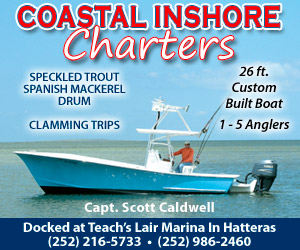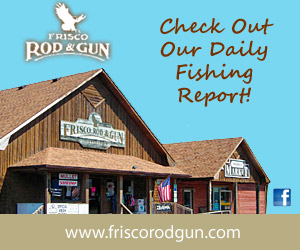BY CATHERINE KOZAK
Commercial fishermen for the fourth time are fighting against passage of a gamefish bill that is winding its way through the North Carolina General Assembly, but this time the political terrain is rougher and the legislation is an entangled mix of actions.
The bill, HB 983, proposes to remove red drum, speckled trout, and estuarine striped bass from commercial fishing and make them solely recreational catches, a measure strongly opposed on the coast.
The same bill, however, also provides funds for dredging and fisheries observers, measures strongly favored on the coast. It would also compensate watermen for losses. And it raises fees on recreational saltwater fishing licenses as a funding mechanism.
Supported by the non-profit Coastal Conservation Association and the Coastal Fisheries Reform Group, both pro-recreational fishing groups, the legislation, named the 2013 Fisheries Economic Development Act, has been sponsored primarily by Rep. Tom Murry, a Wake County Republican; Michael Wray, a Democrat representing Halifax and Northampton counties; Tim Moffitt, a Buncombe County Republican, and John R. Bell, a Republican representing Greene and Craven counties.
State Rep. Paul Tine, a Dare County Democrat, has pushed back by providing counter information for his colleagues, many of whom are first-term legislators who are unaware of the impact on the commercial fishing industry.
“Not all of them have a full understanding of this issue,” Tine said in a telephone interview.
Tine characterized the bill as an effort by special interests aligned with the recreational fishing industry to eliminate public access to the fish. He said only about 10 percent of the catch currently goes to commercial fishermen and consumers, and it would be irresponsible for lawmakers to make a public resource available only to those with private means to catch it.
“Basically, this is a very simple bill, when you get right down to it,” he said. “The issue is who gets access to the public resource. What this bill does is say, ‘We’re going to pick a winner and a loser.’”
Dredging and fisheries management should be a priority for the state, he said, and neither should be tied to conditions that take away rights to certain fish species.
Proponents of the gamefish bill, which would require that the three species are caught by hook-and-line only, contend that it would enhance the resource for the public and would have minimal impact on the commercial fishing industry.
According to information on the CCA Website, which cited statistics from 2004, 2005 and 2008, “very few, if any, commercial fishermen are dependent on harvests of these three species.”
Stephen Ammons, executive director of CCA North Carolina, said in a telephone interview that the current version of the bill does not include ocean stripers.
“We’re trying to be fair,” he said. “The ocean striped bass is more valuable than the inshore striped bass.”
Ammons said that without the Atlantic stripers, the three fish account for 1 percent of the commercial harvest. If they’re included, the value goes up to 2 percent.
But, he contends, if the fish were available only recreationally, more fishermen would want to fish in the state, which translates to more money for state and local economies.
“We feel like the economic value for these three fish are more valuable to the people of North Carolina as a recreational fishery,” he said.
The North Carolina Division of Marine Fisheries, however, said in a press release that allocating the three species to recreational anglers, as well as prohibiting sales by watermen and purchase by consumers, is inconsistent with current policy.
“While our concern is based on a variety of factors,” the statement said, “the greatest issue is that we believe the action is contrary to the N.C. Fisheries Reform Act, our state’s guiding legislation for managing N.C.’s coastal fisheries.
“Based on this legislation, the division recommends strategies to manage the state’s resources for the benefit of all user groups.”
Marine Fisheries also had similar positions on the three prior gamefish bills that failed to become law.
Even some tackle shop owners who serve the recreational fishing community don’t favor the gamefish bill.
“I personally think they feel it’s more fish for them,” said Billy McCaskill at Whalebone Tackle Shop in Nags Head. “And it’s not. They’re not going to catch any more.”
McCaskill, who also scorned the proposed fishing license increases as “a tax” and a “money grab,” said that the idea of taking fish away from commercial fishermen seems to be in opposition to statewide efforts to promote purchase of local seafood catch at supermarkets and restaurants.
“How are they going to be able to do this ‘Wild Caught’ (promotion),” he said, “when you can’t even keep anything?”
Frank Folb, an owner of Frank & Fran’s Fisherman’s Friend in Avon, said that he also opposes increases in license fees.
“They’re not properly using the money now,” he said. “I don’t know what they want to do with the money, but can I assure you it’s not going to help the recreational fishermen.”
Folb, a member of the advisory committee on the recreational saltwater fishing license, said that license sales are down 50 percent this year, which he blames on the cold weather and the ORV beach closures.
But at the same time, Folb said the idea of anglers taking any allocation of fish from watermen is just not fair.
“In my view, it’s totally wrong,” he said. “It is not what the coast of North Carolina wants or needs. The commercial fisherman is under more regulation than any recreational fisherman and he is trying to raise his family and make a living.”
A joint written statement by the Ocracoke Working Watermen’s Association and NC Watermen’s United disputes the proponents’ economic assessments and the contention that the species would be helped by the gamefish legislation.
“CCA commercial fishery valuations for the red drum, speckled trout, and striped bass fisheries are inaccurate because they only reflect dock value, which does not take into account economic multipliers associated with commercial fishing,” the statement said, referring to expenses such as boats, shipping, retail, gear, taxes and fuel.
The bill, the groups say, would also hurt the heritage, economic diversity and viability of the industry.
“Gamefish status is not needed to maintain healthy stocks,” the statement said. “It would have a devastating impact on commercial fishing families’ income, eliminate availability of locally caught state fish, a public resource, to NC residents, tourists, restaurants and seafood retail.”
Ernie Foster, owner of the Albatross Fleet in Hatteras and a charter boat captain since 1958, in an April letter to the General Assembly painted the recreational versus commercial fishing approach in the bill as little more than a power grab with no basis in reality.
“The increase in the number of recreational fishermen over the past 75 years has been dramatic,” he wrote. “Sportfishing marinas now dominate our harbors. This growth took place even while commercial fishing dominated.
“The annual commercial catch numbers have remained relatively constant. It did not require a decrease in commercial fishing activity to generate a corresponding increase in sportfishing, They are independent of one another.”
And opponents say the bill ignores the value that commercial fishing has to tourism in North Carolina, one of the largest economic drivers in the state.
“Ocracoke Fishhouse is important to the local fishing economy of Ocracoke as well as it supports the tourist industry on Ocracoke,” said Hardy Plyler, the fishhouse manager.
“These three fish are essential to being able to maintain our livelihood and the heritage of fishing on Ocracoke Island.”
Tine said that the bill has numerous steps to go in the legislative process, and he dismissed any notion that it may be a done deal. Legislators, he believes, will be less supportive once they learn the facts.
“They’re trying to make it an economic argument,” Tine said about the bill’s proponents. “There is a large discrepancy in regards to the real economic impact.”
Your email address will not be published with your comment.





